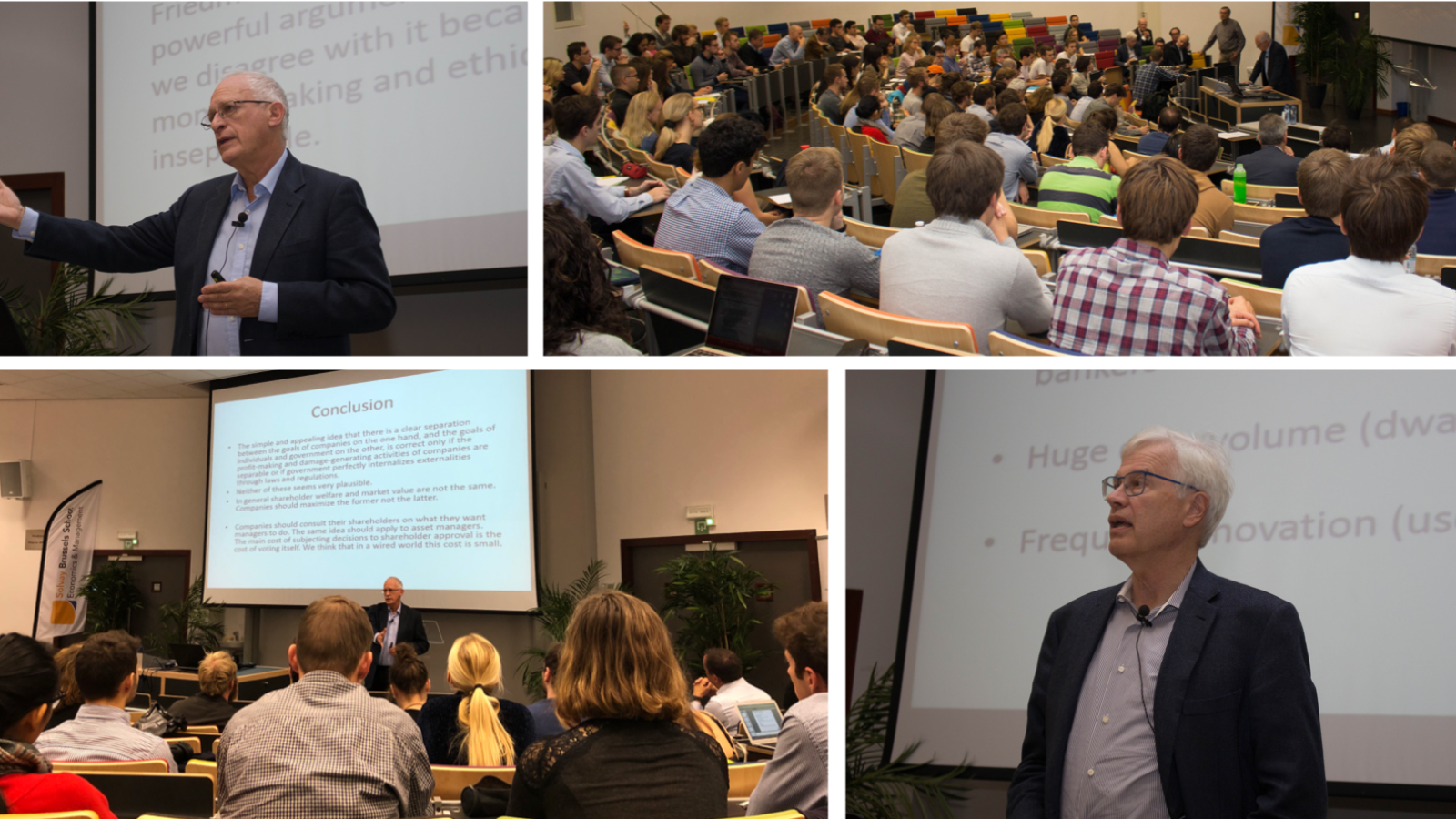Millennials Take Note of Research with a Nobel Purpose

Brussels – 15 October 2018. Nobel Laureates, Oliver Hart (Harvard University) and Bengt Holmström (Massachusetts Institute of Technology) were in Brussels today to speak at the 7th Solvay Alumni Congress on "Ethics and Governance". Ahead of the event, a special seminar session with the Laureates was organised jointly by the European Center for Advanced Research in Economics and Statistics (ECARES), the Goldschmidt Chair for Corporate Governance at the Solvay Brussels School of Economics & Management, and the European Corporate Governance Institute (ECGI). The session was attended by faculty, alumni, doctoral students, masters students, and ECGI members.
Professors Hart and Holmström were awarded the 2016 Nobel Prize in Economics for their contributions to contract theory. Contract theory provides a powerful analytical framework for thinking about corporate governance, corporate finance, industrial organisation and many other subjects that impact on business today. Both Nobel Laureates are also Fellows of the European Corporate Governance Institute (ECGI).
Professor Hart presented his joint work with Luigi Zingales on the subject “Does Serving Shareholders Mean Putting Profit Above All Else?” which is a question that has risen to the forefront since he presented an early draft of this work at the ECGI organised ‘Global Corporate Governance Colloquium’ in Stockholm in 2016. It examines the appropriate objective function of a firm, particularly a public company and proposes a model for considering prosocial preferences in order to take into account the broader social concerns of shareholders. He convincingly argued that a decision can be more socially efficient but less profitable by assigning value to the opportunity cost and a weighting to the prosocial preference of the voter. One example of this being that it would likely be more efficient for a company not to pollute a lake than for individuals to selectively allocate their profits from the same company towards cleaning it up afterwards. He also suggested that governments are far behind public opinion on many social issues, such as climate change. He recommended that companies should conduct more polling of their shareholders in order to take account of prosocial preferences, and he also cautioned against using divestment as a voice because this could have a further adverse effect. However, Professor Hart also pointed out that his research and the proposed economic model do not guarantee a specific outcome, but rather it would allow for more democratic and socially mindful decisions. Even so, the arguments will surely have found friendly footing among the majority of millennials who attended the lecture.
Professor Holmström followed this presentation with an equally powerful message for the young audience. His lecture on “The Promise and Perils of Money Markets” highlighted the close connection between financial crises and short-term debt markets. He espoused the view that debt is opaque by design and that liquid markets are ‘no questions asked’ markets. He compared money markets to the modern-day version of pawning, in that the repurchase right is more important than deciding the supporting value of something that it is over-collateralised. These self-revealing contracts that make up the money market save on information, which may explain why the majority of money markets have no analysts. Professor Holmström also used the example of the diamond market to demonstrate the concept of purposeful opacity. He further interestingly suggested that the stress tests for financial institutions should be less transparent, such as simply stating that an inspection has been completed and that the results were good. Arguing that debt is built on an entirely different philosophy than stock markets, he recommended that over-collateralisation is preferable to spending money on collecting information. His presentation provided an alternative angle for a generation that will have studied the 2007 crisis and will be working in a post-crisis environment of regulation and transparency.
Speaking at the event, Professor Marco Becht, Executive Director, ECGI said;
“This is a remarkable occasion for students and alumni to listen to two ground-breaking Nobel Laureates present research theories that provoke reaction, thought and reflection. The Solvay Alumni Congress, now in its seventh year, continues to deliver leading ideas and valuable connections throughout its network. ECGI is delighted to continue its close association with the Solvay Brussels School and looks forward to future congresses”.